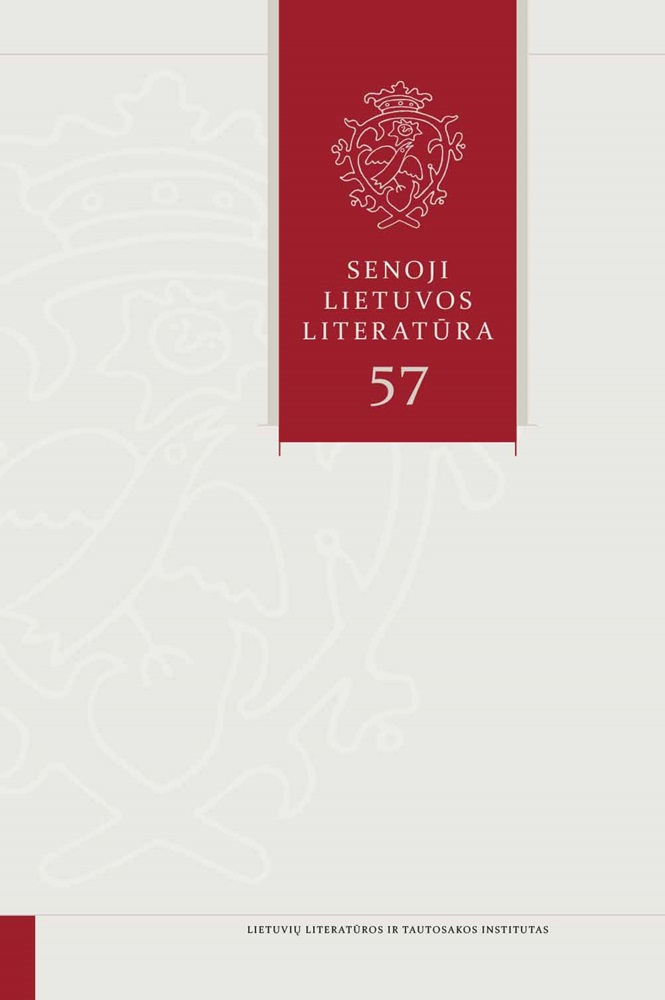The Lithuanian Language and the Political Identity of the Grand Duchy of Lithuania: Experiences of the Sixteenth-Seventeenth Centuries
Abstract
The article examines Lithuanian texts published in the Grand Duchy of Lithuania in the sixteenth and seventeenth centuries from the point of view of political awareness. It elucidates the kind of relationship between the Lithuanian-speaking and reading community and the Lithuanian state of that time. In order to do so, the political vocabulary of works in Lithuanian and the political ideas expressed in them are also examined. At the same time, it considers the political role given to the Lithuanian language by Lithuanian intellectuals writing in other languages and the image of the Lithuanian language and the Lithuanian-speaking community created by political journalism and historiography written in Latin, Russian and Polish. Written by Lithuanian intellectuals and published in Königsberg in 1547, the first Lithuanian book is symbolically dedicated to the Grand Duchy of Lithuania, and its addressee is the Lithuanian and Samogitian people and all the estates of this nation. Mikalojus Daukša, the translator of Postil, published in 1599 at the Vilnius University press, and his patron, Bishop of Samogitia Duke Merkelis Giedraitis urged the citizens of the Grand Duchy of Lithuania to build their Republic on the Lithuanian language. In their view, it was the Lithuanian language that had to unite the different estates in the Grand Duchy and ensure the solidarity of the political nation. In the seventeenth century, the professors of Vilnius University working on Lithuanian books stressed the connection between the Lithuanian language and the Lithuanian state. Konstantinas Sirvydas created not only a cultural, philosophical, theological, but also a political Lithuanian vocabulary: his trilingual dictionary of Polish, Latin, and Lithuanian, first published by the Vilnius University press around 1620, was reprinted four more times during the seventeenth and eighteenth centuries. It was the foundation for the Lithuanian texts of the time. Sirvydas personally wrote and published a collection of sermons for intellectuals in Lithuanian in which he deliberated not only over religious but also political issues. The seventeenth-century Lithuanian hymnbooks and prayer books, which were regularly reprinted in large numbers throughout the eighteenth century and into the first half of the nineteenth century, pleaded Jesus Christ, the Blessed Virgin Mary, and St Casimir, the patron saint of Lithuania, to help ‘our State’, ‘our Kingdom’, ‘the land of Lithuania’, and ‘the Duchy of Samogitia’. There was thus a positive relationship between the community worshipping God in Lithuanian and the state: the society that spoke and sang hymns in Lithuanian felt responsible for their country before God. The Lithuanian texts under scrutiny support the assumption of Professor Jurgis Lebedys that the link between the political programme of Daukša and Giedraitis of the sixteenth and seventeenth centuries and the Lithuanian national movement (Simonas Daukantas, Simonas Stanevičius, and others) of the early nineteenth century was not interrupted and that the tradition of nurturing the Lithuanian language and the connection between the Lithuanian language and the state remained alive all throughout these years. Latin, Russian, and Polish journalistic and historical literature also played a significant symbolic role for the Lithuanian language in the Grand Duchy of Lithuania. The sixteenth-century chronicles, the texts by Venclovas Mikalojaitis, or Michalo Lituanus, Augustinus Rotundus, Maciej Stryjkowski, and Albertas Kojalavičius (Wojciech Kojałowicz) depicted the Grand Duchy of Lithuania, the ‘Republic of Lithuania’ as a state created by the Romans, the ancestors of the Lithuanians, and their descendants, the Lithuanian nobility who then expanded it into the lands of Russia. In these texts, the grand dukes and nobles of Lithuania appear as Lithuanian-speaking people who follow Lithuanian customs. Hence, the historical narrative of Lithuania and the myth of Lithuanian descent from the Romans, which was embedded in the culture of the region, placed emphasis on the Lithuanian character of the Grand Duchy. In the historical narrative, we find not only a political but also a linguistic and cultural notion of the nation. Thus, even after Polish prevailed in the life of the state, the Lithuanian language remained an important factor in Lithuania’s historical and political awareness and the political identity of the Grand Duchy of Lithuania.

This work is licensed under a Creative Commons Attribution 4.0 International License.
Most read articles by the same author(s)
- Mintautas Čiurinskas, Darius Kuolys, Eleonora Terleckienė, Vaiva Vasiliauskaitė, Anotations , Senoji Lietuvos literatūra: Vol. 57 (2024): Senoji Lietuvos literatūra
- Darius Kuolys, After Lublin (1569): The Image of the Republic of Lithuania in the Literature of the Grand Duchy of Lithuania , Senoji Lietuvos literatūra: Vol. 53 (2022): Senoji Lietuvos literatūra
- Ona Dilytė-Čiurinskienė, Darius Kuolys, Annotations , Senoji Lietuvos literatūra: Vol. 52 (2021): Senoji Lietuvos literatūra
- Darius Kuolys, The Image of the Nobles in the Writings of the Grand Duchy of Lithuania , Senoji Lietuvos literatūra: Vol. 47 (2019): Senoji Lietuvos literatūra
- Darius Kuolys, Simonas Daukantas’s Narrative – The Foundation for Lithuanian Identity , Senoji Lietuvos literatūra: Vol. 48 (2019): Senoji Lietuvos literatūra
